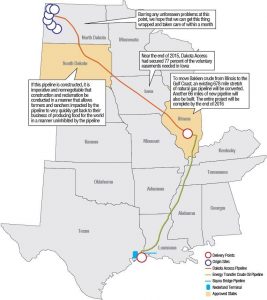In our studies, we are constantly addressing the best practices of environmental management, but we do not often look into serious ways of implementation besides demanding that the best practice for the environment is immediately put into action. I believe that anyone studying environmental issues should also do a comprehensive economic analysis of the United States, and globally, in order to gain perspective on environmental issues. Then, steps taken to improve environmental health can be better tailored for compromise with the corporations that drive economies around the world. By including other perspectives in the conversation about protecting the environment, even if the perspectives are polar opposites, it should increase the chances that policies and steps can actually be implemented to protect the environment.
After reading Heera’s second synthetic post about the Dakota Access Pipeline, an image of loud groups of angry protesters who have latched onto one aspect of the pipeline issue manifested itself in my mind. While one of the largest complaints against the pipeline is that a potential breakage may endanger water sources, the fact that the construction of this pipeline would make the transportation of oil safer, cheaper, and more environmentally friendly due to a decrease in the chances of spillage incidents compared to transportation by road and rail paints a different picture of environmental protection. While I am in favor of the pipeline in this sense, I do not agree with it in terms of the fact that it is being built on the sovereign land of the Sioux Nation without their consent. For every issue there needs to be discussion, which cannot occur if we only know one side of the issue. Early on the year, I asked if we could take an in depth look at the operations of either the coal powered energy plants or the logging companies. However, the discussion of any sort of operations as these was mostly limited to how many carbon emissions or coal ash are produced. I do not believe that any sort of meaningful environmental protection discussion can occur without fully understanding the operations of the companies that provide the energy to enable our daily lives.
The politics found behind every environmental issue can be seen very clearly in the case of water rights. In the case of the pipeline, the benefit of our water resources must be carefully balanced with that of our energy resources. In the article “Water Sustainability in a Changing World”, one of the key issues that is restricting the American people from properly taking care of their water resources is the complicated jurisdictional systems which lead to an inability to view and manage water in a holistic manner. An example of this is that wastewater discharge permits are granted without thought of any downstream uses. The ridiculousness of our current system of managing water allows for different water quality standards for interstate rivers on each side of the same body of water. Our discussion of this topic began in the beginning of the year with the Willamette watershed and noticing the numerous factors that impacted the health of the entire system. Due to the interconnectedness of water sources, there is no reasonable way of managing them in the current system due to its fragmented nature and containing so much bureaucratic red tape among the states, counties, and federal government.
Every environmental issue is not just black in white in the sense that:
- This harms the environment so it is inherently bad and I must be against it
or
- This event is beneficial for the environment so it is inherently good and must be implemented
There is a careful balance that must be struck when managing the environment in conjunction with public policy to promote the common good for all people. With the recent election, Donald Trump’s victory, and his stance on the environment during the election, it is important for the public to maintain pressure on the most important issues in terms of overall environmental health, such as climate change. However, it is also important to keep in mind that everything is a process and as such, fossil fuels must be phased out in a process as well. Any form of demanding immediate and definitive action will only serve to further entrench climate change deniers and those who oppose environmental protection. Both sides of the political spectrum must work together to protect the asset that is the environment. This is an issue that demands global action, which has begun to be taken through deals such as the Paris Agreement, which are instrumental to effectively manage global warming.
In order to protect the environment, the best option appears to be education and exposure at an early age. However, most adults right now have a mindset that is extremely difficult to change, and for some, no amounts of education and exposure will do anything to change their perspective on the value of the environment. It is the adults, not children that are driving current events, so their viewpoints must be taken into consideration in order to gain any traction in environmental protection. With global warming as a critical issue, we are at a junction where we cannot just wait for education initiatives to take effect. Rather, the best option appears to be careful negotiation that values corporate interests as much as it does environmental issues. There must be a give and take here because of the drastic need for legislation to be passed that protects are valuable natural environment.


